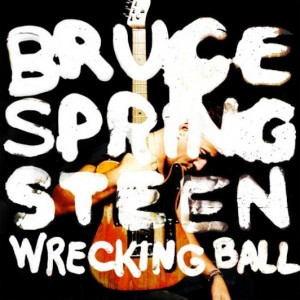Here’s a thought: would Bruce Springsteen have fared so well critically had he been British? His lyrical mix of dirty realism and clock-card romanticism, his music’s blend of emphatic AOR and polished blues, the ageless crooning, the inevitability of finding one of his albums in a Volvo’s glove compartment: all of these are traits shared with Mark Knopfler and even Chris Rea, the would-be laureates of England’s own post-industrial rust-belt. Granted, neither Knopfler or Rea have explored the (relative) musical and political leftfield as Springsteen has, what with his Suicide and Pete Seeger covers and advocacy of liberal causes, and neither have made a record as brilliantly excoriating as 1982’s lauded Nebraska. This doesn’t mean, though, that there’s not occasionally a suspicion that Springsteen’s alternative cachet, at least in the UK, rests as much on his injection of a Transatlantic exoticism into the workaday as on the risks he’s taken from time to time.
Wrecking Ball is perhaps his most identifiably American album, which is some claim. Drawing on a disparate range of popular forms, it seeks to draw these together in the service of what’s been acclaimed by many as Springsteen’s most decisively anti-establishment statement. Whether or it’s as politically acute as the hype suggests is debatable, but it’s certainly the case that the record assembles a coalition of genres towards some end. There’s palatable drivetime rock, as usual, but there’s also unexpectedly lush country, gospel, rap, hints of electronic experimentation, and even forays into Dropkick Murphys-style Celtic punk. Recorded with only a few members of the E-Street Band, including saxophonist Clarence Clemons – who sadly died last year – the new album seems driven by an anthropological interest in variety.
Springsteen has always taken it upon himself to ventriloquise the frustrations and hopes of the blue-collar US, and it makes sense to assume that the magpie tendencies of Wrecking Ball derive from a wish to make an album that truly represents the diversity of the American working class. In the past, it’s usually been the case that his records are almost neurotic in their stylistic coherence, and that this uniformity of musical mood has made his narrative viewpoints seem more partial than they actually are. Now, one is made to feel that a greater range of voices have been consulted in a broad survey of a nation’s popular dissent.
This might sound more democratic than it is in practice. Springsteen has rarely been able to resist the messianic – even on Nebraska, the martyrdom was hard to avoid – and, from opener ‘We Take Care of Our Own’ to the tellingly-named ‘We Are Alive’, Wrecking Ball evokes a surreal image of Bruce touring from state to state at the head of an ever-growing pilgrimage of musicians. On ‘Death to My Hometown’, he ships up to Boston to pick up some penny whistle players and a banjo, following this journey immediately with a trip to the Cornbelt to borrow its peculiar style of smoothly-produced pop-country for ‘This Depression’. Michelle Moore adds a rap on ‘Rocky Ground’, where warm electronics, loping breakbeats, and pulpit samples lend a redemptive air that uncannily echoes some of Andrew Weatherall’s work with Primal Scream; while it’s easily Wrecking Ball’s most adventurous track, it’s also most representative of Springsteen’s urge to part the Red Sea and lead his people home.
Maybe this isn’t the worst thing in the world. In times which are, to understate wildly, worrying, it’s something of a relief to see a major artist make a rallying call rather than keeping coy about their politics. Even if some of the album’s humanism cloys slightly – on ‘Jack Of All Trades’, the protagonist suggests "We’ll start caring for each other/ like Jesus said we might" – it’s reassuring to hear the argument against corporate greed advanced with such forthrightness. Maybe the State of the Nation address doesn’t need ambiguity. If this is the case, then Springsteen has done a good job: ‘Shackled and Drawn’ and the aforementioned ‘Death to my Hometown’ lack finesse, but they’re both bar-pounding demands for a kind of freedom radically at odds with what the American right mean by that word.
At the same time, Wrecking Ball does leave the impression of being somewhat belated. ‘We Take Care of Our Own’ features explicit references to Hurricane Katrina and the Republican betrayal of New Orleans, and the album’s wider project of trying to reclaim the nobler aspects of American populism (particularly of its Christian aspects) from the religious right might also have been best made five or six years ago rather than now. One may even think that Springsteen is addressing European resentments towards America, those broad-brush newspaper judgements which always seem half a decade out of date. For a variety of ingrained cultural reasons, we tend to be incredibly receptive in Britain to Americans willing to criticise their own country and its policies: often, we’re so flattered by this that we ignore the subtleties of what they have to say. Ultimately, this would have made a great anti-Bush album, but – rather like Britain’s own production-line rockers – Wrecking Ball is marred by late-to-the-table dilettantism.


